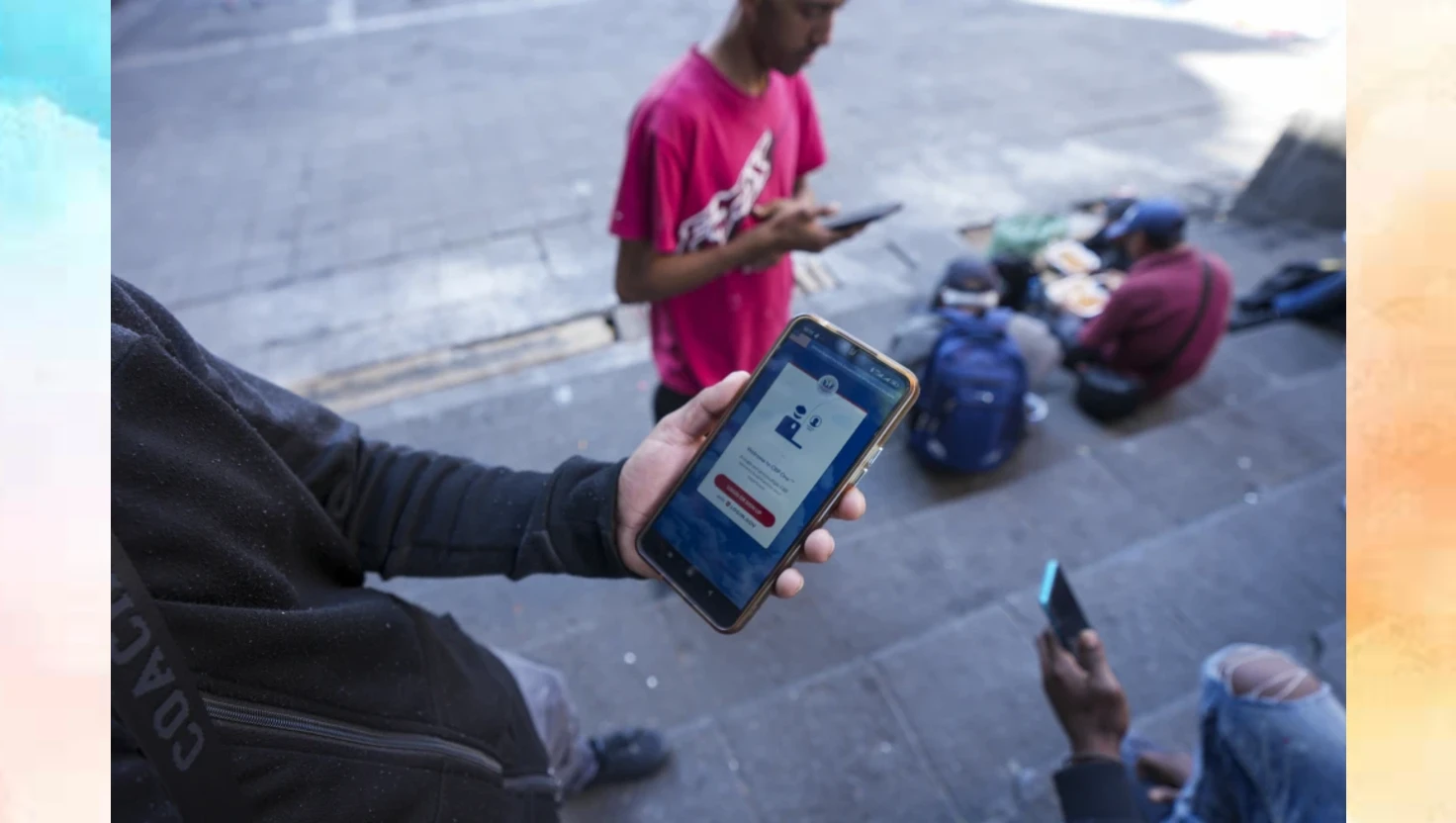Protest against US government proposal to collect immigrants’ social media information

Protest against US government proposal to collect immigrants’ social media information
Civil rights groups warn that a new USCIS plan to collect social media data from immigrants could undermine privacy, free speech, and fair process.
US immigration agency criticised over social media data plan
A leading Hispanic civil rights organisation has condemned a proposal by the United States Citizenship and Immigration Services (USCIS) to collect social media details from immigration applicants, warning that the measure could threaten free speech and privacy rights.
In a joint submission made to the Department of Homeland Security on 5 May, UnidosUS and Asian Americans Advancing Justice – AAJC described the proposal as an overreach of government surveillance powers that could create chilling effects on online expression and disproportionately harm immigrant communities.
The proposal, published under Docket ID USCIS-2025-0003, would require immigrants applying for benefits—including asylum, naturalisation, and permanent residence—to provide social media identifiers as part of their applications.
Mass surveillance concerns raised
According to UnidosUS, the plan would affect more than 3.5 million applicants annually, spanning a wide range of immigration categories. The organisation argues that rather than targeting specific threats, the programme would function as a broad surveillance tool.
“This proposal represents a dangerous expansion of government surveillance powers that threatens constitutional rights, privacy protections, and democratic norms,” the groups said in their official comment to the federal register.
They added that such a database could link real identities to online activity with minimal safeguards, potentially setting a precedent for wider surveillance.
Constitutional and legal issues highlighted
UnidosUS and its partners contend that the proposed data collection could infringe upon several constitutional protections. They cite First Amendment concerns over freedom of speech and association, as well as possible violations of due process and Fourth Amendment protections against unreasonable searches.
“The knowledge that government officials will scrutinise online expression will compel many applicants to self-censor,” the submission warned.
The groups also questioned whether the data collection would comply with existing U.S. privacy laws, including the Electronic Communications Privacy Act, which limits government access to digital communications without proper legal authorisation.
No evidence of security benefit, critics say
The organisations argue that the government has provided no clear evidence that collecting social media handles would enhance national security or immigration screening.
They pointed to a 2017 report by the Department of Homeland Security’s Office of Inspector General, which found that previous social media screening pilots lacked clear performance metrics and failed to demonstrate their usefulness.
The proposal also offers no information about how social media data would be interpreted, how it might influence immigration decisions, or what recourse applicants would have if their posts were misinterpreted.
Risk of discrimination and implementation gaps
Civil rights advocates voiced concern that vague implementation guidelines could lead to arbitrary decisions and discriminatory outcomes. Past government programmes, they noted, disproportionately targeted people from Muslim-majority countries or Arabic-speaking communities.
The absence of clear training standards or protocols for interpreting cultural references, language nuances, or humour could amplify the risk of misjudgement, they said.
In addition, technical challenges such as verifying dormant accounts, dealing with private or deleted profiles, and managing language differences were cited as major flaws in the programme’s feasibility.
Broader social and economic implications
The submission warned that the proposed monitoring could discourage high-skilled workers, researchers, and creatives from choosing the United States as a destination, particularly if they fear their online activity could be taken out of context.
Moreover, the chilling effect on digital expression could erode immigrant engagement in civic life, weakening efforts to build inclusive and integrated communities.
“The United States can maintain security while respecting constitutional values and privacy,” the letter concludes. “This proposal, as currently formulated, fails to strike that essential balance.”
Call for withdrawal
UnidosUS urged USCIS to withdraw the proposed data collection plan and consider alternative vetting approaches that are both evidence-based and respectful of civil liberties.
For further dialogue, the groups directed inquiries to Claudia Ruiz, Civil Rights Policy Advisor at UnidosUS, and Lia Nitake, Senior Director of Technology and Media Policy at Asian Americans Advancing Justice – AAJC.
Context: Immigration policy and digital rights
The debate comes amid a broader global conversation about the balance between national security and individual privacy, particularly as governments increasingly explore the use of digital data in immigration and law enforcement contexts.
In the United States, concerns over surveillance have long intersected with immigration policy, particularly after 9/11 and during periods of heightened political tension. Civil liberties groups continue to advocate for transparent, narrowly tailored policies that avoid casting suspicion on entire communities.
The USCIS proposal remains under review, with public comments collected through the federal portal as part of the regulatory process.
A leading Hispanic civil rights organisation has condemned a proposal by the United States Citizenship and Immigration Services (USCIS) to collect social media details from immigration applicants, warning that the measure could threaten free speech and privacy rights.
In a joint submission made to the Department of Homeland Security on 5 May, UnidosUS and Asian Americans Advancing Justice – AAJC described the proposal as an overreach of government surveillance powers that could create chilling effects on online expression and disproportionately harm immigrant communities.
The proposal, published under Docket ID USCIS-2025-0003, would require immigrants applying for benefits—including asylum, naturalisation, and permanent residence—to provide social media identifiers as part of their applications.
Mass surveillance concerns raised
According to UnidosUS, the plan would affect more than 3.5 million applicants annually, spanning a wide range of immigration categories. The organisation argues that rather than targeting specific threats, the programme would function as a broad surveillance tool.
“This proposal represents a dangerous expansion of government surveillance powers that threatens constitutional rights, privacy protections, and democratic norms,” the groups said in their official comment to the federal register.
They added that such a database could link real identities to online activity with minimal safeguards, potentially setting a precedent for wider surveillance.
Constitutional and legal issues highlighted
UnidosUS and its partners contend that the proposed data collection could infringe upon several constitutional protections. They cite First Amendment concerns over freedom of speech and association, as well as possible violations of due process and Fourth Amendment protections against unreasonable searches.
“The knowledge that government officials will scrutinise online expression will compel many applicants to self-censor,” the submission warned.
The groups also questioned whether the data collection would comply with existing U.S. privacy laws, including the Electronic Communications Privacy Act, which limits government access to digital communications without proper legal authorisation.
No evidence of security benefit, critics say
The organisations argue that the government has provided no clear evidence that collecting social media handles would enhance national security or immigration screening.
They pointed to a 2017 report by the Department of Homeland Security’s Office of Inspector General, which found that previous social media screening pilots lacked clear performance metrics and failed to demonstrate their usefulness.
The proposal also offers no information about how social media data would be interpreted, how it might influence immigration decisions, or what recourse applicants would have if their posts were misinterpreted.
Risk of discrimination and implementation gaps
Civil rights advocates voiced concern that vague implementation guidelines could lead to arbitrary decisions and discriminatory outcomes. Past government programmes, they noted, disproportionately targeted people from Muslim-majority countries or Arabic-speaking communities.
The absence of clear training standards or protocols for interpreting cultural references, language nuances, or humour could amplify the risk of misjudgement, they said.
In addition, technical challenges such as verifying dormant accounts, dealing with private or deleted profiles, and managing language differences were cited as major flaws in the programme’s feasibility.
Broader social and economic implications
The submission warned that the proposed monitoring could discourage high-skilled workers, researchers, and creatives from choosing the United States as a destination, particularly if they fear their online activity could be taken out of context.
Moreover, the chilling effect on digital expression could erode immigrant engagement in civic life, weakening efforts to build inclusive and integrated communities.
“The United States can maintain security while respecting constitutional values and privacy,” the letter concludes. “This proposal, as currently formulated, fails to strike that essential balance.”
Call for withdrawal
UnidosUS urged USCIS to withdraw the proposed data collection plan and consider alternative vetting approaches that are both evidence-based and respectful of civil liberties.
For further dialogue, the groups directed inquiries to Claudia Ruiz, Civil Rights Policy Advisor at UnidosUS, and Lia Nitake, Senior Director of Technology and Media Policy at Asian Americans Advancing Justice – AAJC.
Context: Immigration policy and digital rights
The debate comes amid a broader global conversation about the balance between national security and individual privacy, particularly as governments increasingly explore the use of digital data in immigration and law enforcement contexts.
In the United States, concerns over surveillance have long intersected with immigration policy, particularly after 9/11 and during periods of heightened political tension. Civil liberties groups continue to advocate for transparent, narrowly tailored policies that avoid casting suspicion on entire communities.
The USCIS proposal remains under review, with public comments collected through the federal portal as part of the regulatory process.

US Seeks Collection of Social Media Handles on Immigration Forms
US immigration authorities propose a wider collection of social media handles from benefit applicants, raising concerns over privacy, speech rights, and oversight.
| 2025-07-30

UK police unit to monitor social media to track violent protests before they erupt
The UK is launching a new police unit to monitor social media for signs of anti-migrant unrest. Officials say it will support public safety, but critics cite free speech concerns.
| 2025-07-30

OpenAI bans Chinese accounts working for social media surveillance company
OpenAI bans China-linked accounts accused of using ChatGPT to monitor protests abroad and send reports to Chinese authorities.
| 2025-07-30




